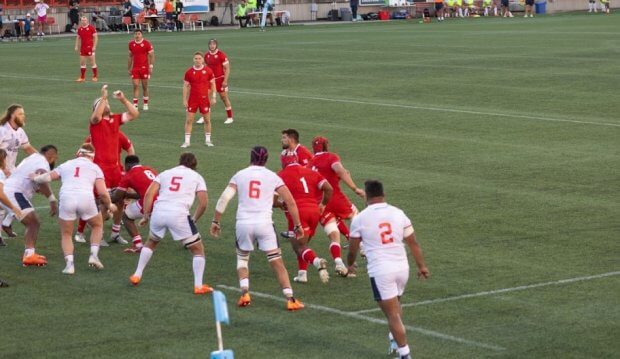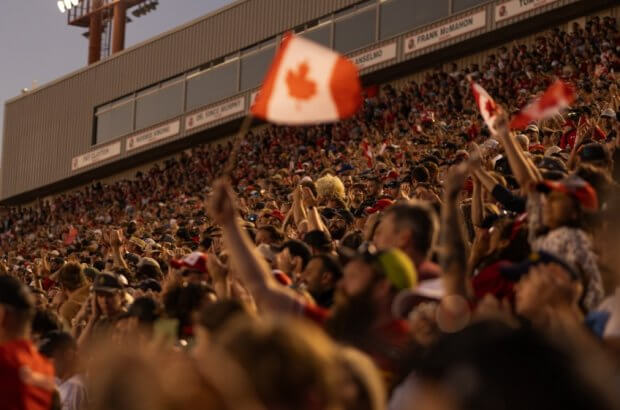Scheduled Website Maintenance
We’re currently in the process of moving to a new and improved server environment. During this transition, the website may experience brief interruptions or temporary outages.
We appreciate your patience while we complete this upgrade. Service will return to normal shortly, with improved performance and reliability.
Thank you for your understanding.
Welcome to the guest writing ranks of G&GR and a huge thank you to Dat Mavis:
Last Friday saw the Pacific Nations Cup kick off and International rugby made its way back to Calgary for the first time since 2017. 11587 people came out on a beautiful late summer afternoon to see the 25th ranked Canadian men’s team in a test match against the 16th ranked USA Eagles.
Canada has a proud history as a rugby nation having having enjoyed a period of sustained success in the early 1990s where they beat nations such as France, Wales and Argentina, hosted tours of teams en route to the UK (including the Wallabies who played in Calgary in 1993) and progressed to the quarter-final stage of the 1991 World Cup. The Canucks find themselves currently climbing out of a sustained low point, with only two wins in their last 10 tests coming in to this match.
International rugby in the USA goes back even further, they played their first international game, against Australia, back in 1912 and continued with sporadic tests up until 1924 which including winning two Olympic gold medals, before a drought until 1976 (accounted for by rugby’s removal from the Olympic program) when they resumed regular tests, again against the Wallabies.
With the match kicking off under clear blue skies the USA seemed to be making more astute decisions in the early passages but Canada were organised and persistent and capitalised on a USA error to set up camp in the 22, eventually scoring first through excellent tight play and quick thinking. The USA hit back having worked their way back up the other end and then capitalised on their momentum to take a second try at the 17 minute as they seemed to be about to pull away. Canada were not going away easily and scored a brilliant heads up try out wide – four tries in 18 minutes, if this sounds like a frenetic pace, it was. Although the scoring slowed somewhat the half remained end to end with the teams going into oranges tied up at 17 each.

Second half
An exchange of penalties early in the second half kept the game tied and the scores were locked 20-all at 55 minutes before Canada burst the dam, making the most of another extended period of pressure and scoring again through their monumental #8 Tyler Ardron who stepped against the grain to cross for his FOURTH try of the game. Shortly after this the Eagles muffed a box-kick regather under no pressure and the men in red swooped again for a spectacular counter attacking try to open up a 14 point lead and take a grip on the game they would never relinquish, claiming their first win in this tournament since 2013 and their first over the USA since 2021, all but securing their place at the next World Cup.
It’s clear that access to MLR for both these countries has given many players access to more rugby and professional environments (not to mention the ability to “capture” players from other countries, a glance down the team sheet for the USA reveals a link to Australian rugby royalty); however, it was overseas born or based players who truly looked a cut above. For the Eagles, Bristol playmaker AJ McGinty pulled the strings well early on and kicked his goals to keep the scoreboard ticking over – he did however cop a yellow card for a cynical knock on and Canada used his absence to go bang bang and seal the match. Their Scottish winger, Rufus McLean, was also big early on with a couple of crucial involvement leading up their second try – although reading his wiki he seems to be not a nice bloke, not that American needed to import any of those from Scotland.
For the Maple Leafs you couldn’t go past Tyler Ardron, he seemed to be everywhere, making key contributions on both sides of the ball again and again not the least of which was scoring four tries and even suspending his self-respect to try a Dan Sheehan style jump over the ruck/tackler try attempt, which didn’t come off. Their fullback Peter Nelson was also at the centre of a lot of good things they did on the day, bringing flair in from the back. Canada’s real point of difference, however, was their cohesive play around the ruck and the lineout – consistently making a mess of US ball and securing their own which allowed them ample platforms from which to attack, even through periods of the game when they didn’t have the momentum of the contest.
A word also for Luke Pearce who I thought was excellent with the whistle, allowing the game to flow, managing his TMO interventions and the captains with a firm hand and good humour when needed.

